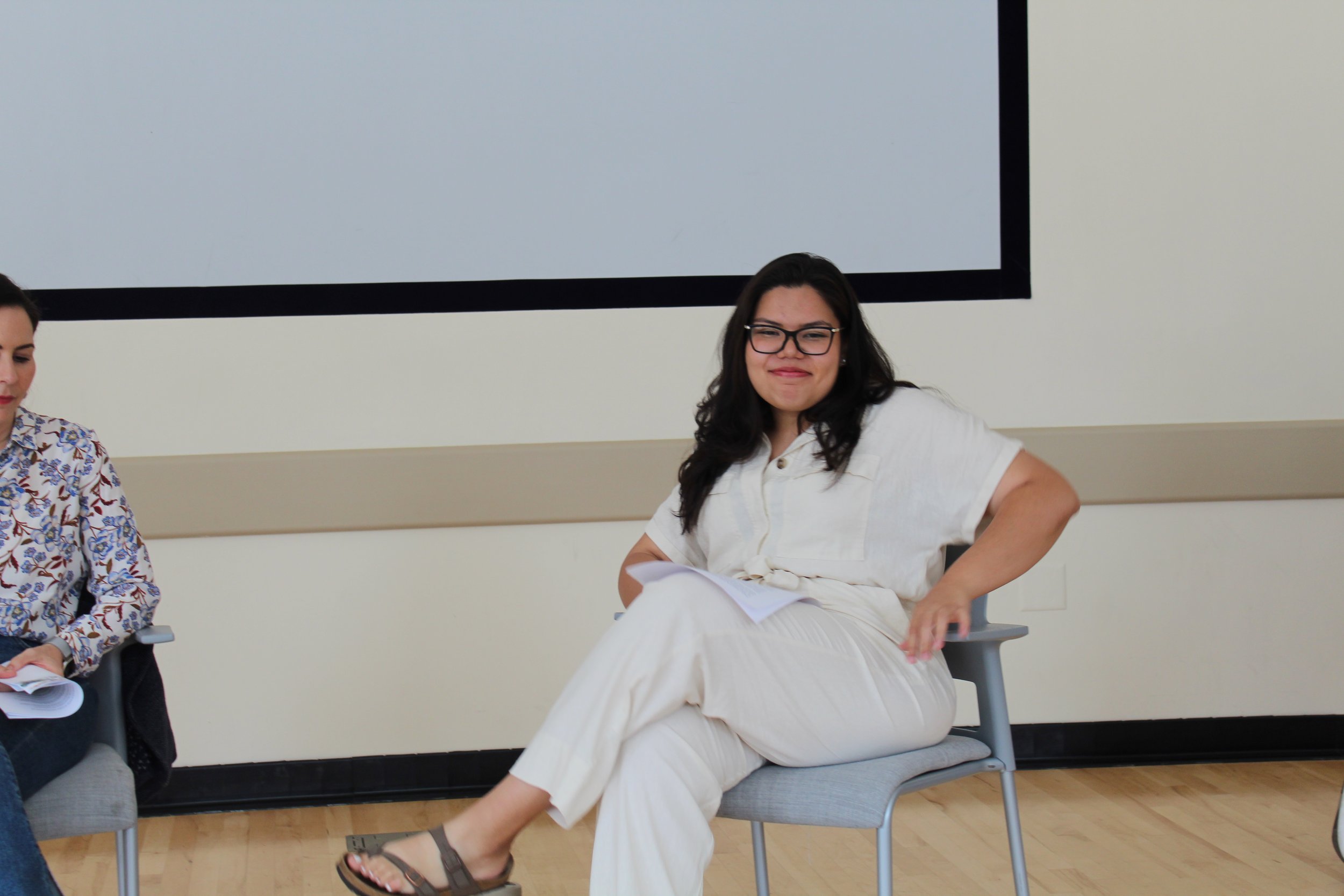By Faith Talamantez
Learning foreign languages is a valuable skill that allows for both creative potential and connections with new people and cultures, a UC Santa Barbara audience was told last week.
“You get to reinvent yourself,” says Sabine Frühstück, a UCSB professor of modern Japanese cultural studies. "There's so much creative potential...in learning a foreign language."
Frühstück was speaking at For the Love of Language, a panel discussion on the importance of learning languages and UCSB’s innovative approaches to teaching them. She was joined by Magda Campo, a continuing lecturer who teaches Arabic in the Department of Religious Studies, and Laura Marqués-Pascual, the language program director in the Department of Spanish and Portuguese.
Magda Campo, left, a continuing lecturer in Arabic in the Department of Religious Studies; Sabine Frühstück, center, a UCSB professor in the Department of East Asian Languages and Cultural Studies; and Laura Marqués-Pascual, the language program director in the Department of Spanish and Portuguese, were panelists at HFA Speaks: For the Love of Language.
The event, hosted by UCSB’s Division Humanities and Fine Arts, was a part of the ongoing series “HFA Speaks,” where faculty and students within the division are invited to speak on timely topics.
The panel was moderated by Jackie Jauregui, one of HFA’s web and social media interns, who noted that challenges have come up for people passionate about learning languages — including fewer course offerings recently. Campo explained that despite earlier popularity among students, enrollment in language courses at UCSB has gone down.
She said it is unclear whether the decline comes as a result of budget cuts, convenient online learning services such as Duolingo, or because of the ease with which artificial intelligence can do instant translation. Marqués-Pascual also noted the decrease in enrollment, and added that one cannot expect to learn a language in a time frame as short as one of UCSB’s 10-week courses. “There has been a decline… not only at UCSB. This has been happening all across the U.S.”
According to the Modern Languages Association, between 2016 and 2020, there was an overall decrease of 17 percent in enrollments in all languages at American universities, which was double the decrease in college enrollments during that time, Marqués-Pascual said. “This is a trend that is affecting not just the languages, but the humanities in general.”
Frühstück said she is “very, very worried” about the drop in language learning in the United States, because points to isolationism at a time when the world is more interconnected that ever. “This is an American trend,” said Frühstück. “The academy is already deglobalizing, is already stepping away from the willful, forceful, and curious engagement with other cultures,” she said. “If you think about what that means for trade relations, what that means for international relations, what that means for security, what that means for one-on-one cultural understanding. It's very, very dramatic.”
Jackie Jauregui, one of HFA’s web and social media interns, moderated “HFA Speaks: For the Love of Language.” Jauregui is double majoring in LInguistics and Spanish and minoring in German.
Despite these obstacles, UCSB serves as a leader among universities when it comes to preserving languages. UCSB has also been a pioneer in language learning, with so many different departments focusing on languages. Within her own department, Marqués-Pascual has implemented classes in both Spanish and Portuguese that are designed for heritage speakers, allowing teachers to focus on their unique needs as compared to those coming into a language with no prior knowledge. Marqués-Pascual also praised the Linguistics department at UCSB for its work preserving indigenous languages.
“Our language departments are moving beyond just teaching language and literature. We are adopting an interdisciplinary approach to the teaching of languages,” Marqués-Pascual said. “We are teaching a way of looking at the world. When you learn a language, you learn a lot about different cultures, history, civilization, you learn a lot of soft skills, how to communicate with other people from different backgrounds. You learn how to maneuver, how to move around in a diverse environment.”
Languages classes, said the panelists, build community as well as cross-cultural understanding. Frühstück said that many courses within the East Asian Languages and Cultural Studies Department bring students from Japan and America together, allowing them to work together to improve each other’s ability with English and Japanese respectively.
In a similar manner, Campo described her gatherings with Arabic students in which they try Middle Eastern foods as a way to learn more about the culture associated with Arabic. Building community allows language departments not only to foster a healthy learning environment, but also, to have fun with their students, the faculty members said.
Even more, the panel emphasized that apps that teach languages cannot replace learning from a teacher, and learning with other students. In-person connection and speaking is a critical component of learning a language.
“Maybe the machine will translate,” Campo said. “They do a literal translation, but the nuance is missing.”
Without interacting with native speakers, it can be hard to fully grasp a foreign language, said Marqués-Pascual. She explained that sarcasm and humor are easily lost in the basic online translations, along with the culture infused throughout the language. Although online translators can be a useful tool for finding vocabulary, especially when travelling, the panel agreed that cell phone apps cannot serve as a replacement for the learning done in a classroom.
“It is a lifelong experience to learn a language and speak it well,” Marqués-Pascual said.
Faith Talamantez is a third year UCSB student majoring in Writing and Literature. She is a Web and Social Media intern for the Division of Humanities and Fine Arts.



